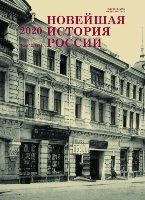Пиренейский конфликт 1936–1939 годов и формирование советского поколения войны
The Pyrenean Conflict of 1936–1939 and the Formation of the Soviet Generation of War
Author(s): Irina Vladimirovna VolkovaSubject(s): Civil Society, History of ideas, Military history, Social history, Crowd Psychology: Mass phenomena and political interactions, Interwar Period (1920 - 1939), Peace and Conflict Studies
Published by: Издательство Исторического факультета СПбГУ
Keywords: world revolution; civil war; Spain; pupils; children; Union of Soviet Socialist Republics;
Summary/Abstract: This article investigates responses of Soviet schoolchildren of middle and older ages towards the Spanish Civil War and the arrival of Republican children to the USSR in the second half of the 1930s. Interest in reactions of this age category is connected with the fact that soon after they would bear the brunt of sacrifices in the struggle with Nazi Germany and received the status of front-line generation. Emotionally perceived events in a distant country became the source of its ideas about the future total war of the USSR and an important frontier in psychological preparation for it. Despite the refusal of the country’s political leadership to foment a revolution in Spain, this idea was guiding for young Soviet citizens. The Republican struggle, meaningful as an outbreak of world revolution, gave rise to their various manifestations of solidarity, including the collection of funds, attempts of individual and group escapes to Spain, and the self-organization of paramilitary units to join international teams. In the light of the dramatic experience of the Spanish Republicans, the future of the communist project among Soviet youth was now linked only to the fierce war that the Soviet Union was to withstand with some not necessarily decisive support from the progressive world community.
Journal: Новейшая история России
- Issue Year: 10/2020
- Issue No: 30
- Page Range: 183-202
- Page Count: 20
- Language: Russian

